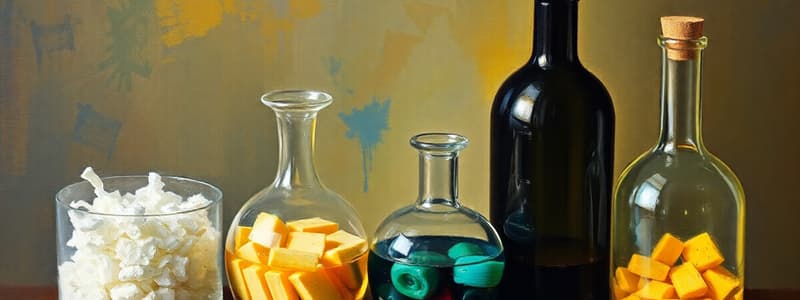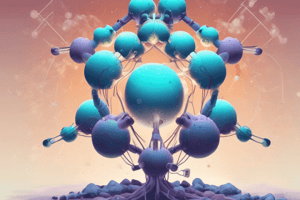Podcast
Questions and Answers
What is a mixture?
What is a mixture?
A substance that can be separated into two or more pure substances by physical means.
Which of the following is NOT an example of a mixture?
Which of the following is NOT an example of a mixture?
- Sea water
- Water
- Air
- Hydrogen (correct)
Mixtures can be broken down into their components only by chemical means.
Mixtures can be broken down into their components only by chemical means.
False (B)
What is a compound?
What is a compound?
What distinguishes the properties of a compound from its constituent elements?
What distinguishes the properties of a compound from its constituent elements?
The mass of a compound must equal the sum of the masses of its constituent __________.
The mass of a compound must equal the sum of the masses of its constituent __________.
What is the ratio of hydrogen to oxygen by mass in water?
What is the ratio of hydrogen to oxygen by mass in water?
Which of the following is a compound?
Which of the following is a compound?
Match the following compounds with their formulas:
Match the following compounds with their formulas:
Provide an example of a chemical reaction.
Provide an example of a chemical reaction.
Flashcards are hidden until you start studying
Study Notes
Mixtures
- Mixtures can be separated into multiple pure substances using physical methods like filtration, sublimation, or distillation.
- Components are the pure substances that make up a mixture.
- Common examples of naturally occurring mixtures include air, water, seawater, soil, rocks, and minerals.
- Living organisms, like plants and animals, and food are complex mixtures.
- Many human-made substances, including milk and blood, are mixtures.
Compounds
- Compounds are formed when elements combine in a fixed ratio by mass or number of atoms.
- Compounds can only be broken down into their constituent elements through chemical reactions, not physical methods.
- Elements combine in a fixed proportion, like the 2:1 ratio of hydrogen to oxygen by mass in water.
- Compounds have properties distinct from the elements they are composed of. For example, water has different properties than hydrogen and oxygen.
- The mass of a compound is equal to the sum of the masses of its constituent elements.
Characteristics of Compounds
- Chemical Decomposition: Compounds can only be broken down into their constituent elements by chemical means.
- Fixed Proportion: Elements combine in a fixed proportion by mass or number of atoms when forming a compound.
- Mass Ratio: Elements combine in a set mass ratio. For example, the mass ratio of hydrogen to oxygen in water is 1:8.
- Different Properties: The properties of a compound are different from the properties of the elements that compose it.
Examples of Compounds
- Sodium chloride (NaCl)
- Calcium oxide (CaO)
- Calcium chloride (CaCl₂)
- Zinc chloride (ZnCl₂)
- Hydrogen chloride (HCl)
- Sulphuric acid (H₂SO₄)
- Nitric acid (HNO₃)
- Sodium sulphate (Na₂SO₄)
- Sodium hydrogencarbonate (NaHCO₃)
- Plaster of Paris (CaSO₄ H₂O)
Examples of Reactions
- Hydrogen + Oxygen --> Water
- Carbon + Oxygen --> Carbon dioxide
Studying That Suits You
Use AI to generate personalized quizzes and flashcards to suit your learning preferences.




